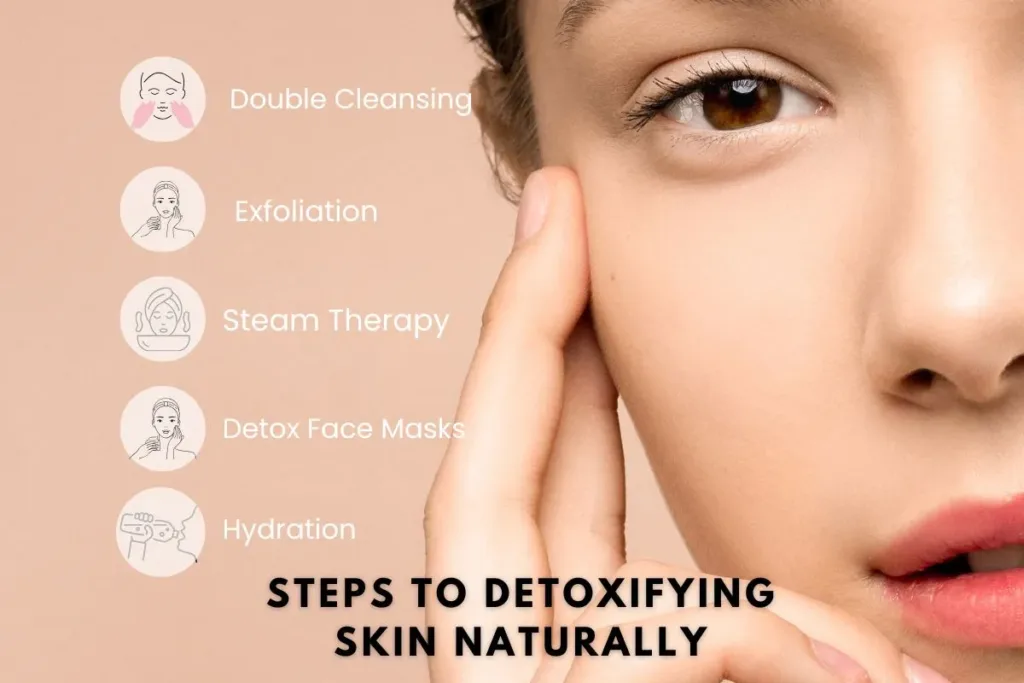No products in the cart.

In today’s world, our skin is constantly exposed to environmental pollutants, harsh chemicals, and synthetic ingredients found in many skincare products. This exposure can lead to clogged pores, dullness, and premature aging. A dedicated skin detox routine can help rejuvenate your complexion, restoring its natural glow and vitality.
But what exactly does a skin detox entail? Is it merely a trend, or is there science behind it? In this comprehensive guide, we’ll delve into effective strategies to detoxify skin, remove harmful substances and promote overall skin health.
Understanding Skin Detox
A skin detox involves eliminating toxins, impurities, and pollutants from the skin to improve its health and appearance. While our bodies naturally detox skin through organs like the liver and kidneys, our skin, being the largest organ, also plays a crucial role in this process. Regular exposure to environmental aggressors and chemical-laden products can overwhelm the skin’s natural defenses, necessitating a targeted face detox routine.
Signs You Needs a Face Detox
1. Persistent Breakouts
Frequent acne or blemishes can be indicative of toxin buildup in the skin. When the natural detoxifying skin processes are overwhelmed by environmental pollutants, excessive sebum production, or the accumulation of dead skin cells, pores can become clogged, leading to breakouts. Additionally, the use of comedogenic skincare products or exposure to irritants can exacerbate this condition. Implementing a consistent skincare routine that includes gentle cleansing, exfoliation, and the use of non-comedogenic products can help mitigate these issues.
2. Dull Complexion
A lackluster or dull complexion often results from the accumulation of impurities on the skin’s surface. Factors such as inadequate exfoliation, dehydration, and exposure to environmental stressors like pollution can impede the skin’s natural radiance. Regular exfoliation using mild exfoliants can aid in removing dead skin cells, while proper hydration ensures the skin remains plump and vibrant. Incorporating antioxidants into your skincare regimen can also combat oxidative stress, restoring the skin’s natural glow.
3. Dryness or Oiliness
Experiencing excessive dryness or oiliness can signal an imbalance in the skin’s natural processes. Over-cleansing or the use of harsh skincare products can strip the skin of its natural oils, leading to dryness. Conversely, the skin may compensate for this loss by overproducing oil, resulting in an oily complexion. Maintaining a balanced skincare routine that includes gentle cleansers and appropriate moisturizers can help restore equilibrium. Additionally, ensuring adequate hydration and avoiding over-exfoliation can prevent further disruption of the skin’s balance.
4. Sensitivity
Increased sensitivity, characterized by redness, itching, or a burning sensation, may indicate a compromised skin barrier. The skin barrier serves as a protective shield against environmental aggressors and helps retain moisture. Factors such as over-exfoliation, exposure to harsh chemicals, or environmental stressors can weaken this barrier, making the skin more susceptible to irritation. To restore the skin’s integrity, it’s essential to use products containing barrier-repairing ingredients like ceramides, hyaluronic acid, and niacinamide. Limiting the use of potential irritants and adopting a gentle skincare routine can further support the healing process.
Steps to Detoxifying Skin Naturally

1. Double Cleansing
Double cleansing is a two-step facial cleansing method that ensures thorough removal of impurities. The first step involves using an oil-based cleanser to dissolve makeup, sunscreen, and excess sebum. Oil-based cleansers are effective because they bind to oil-based impurities, allowing them to be rinsed away easily. The second step uses a water-based cleanser to remove any remaining dirt, sweat, and water-based debris. This method ensures that the skin is deeply cleansed without stripping it of its natural oils, maintaining the skin’s moisture balance. Regular double cleansing can lead to clearer pores, reduced breakouts, and improved skin texture.
2. Exfoliation
Exfoliation is the process of removing dead skin cells from the skin’s surface, promoting cell turnover and revealing fresher skin beneath. There are two main types of exfoliation: physical and chemical. Physical exfoliants, like scrubs containing fine particles, manually slough off dead cells. Chemical exfoliants use acids like alpha-hydroxy acids (AHAs) and beta-hydroxy acids (BHAs) to dissolve the bonds between dead cells, allowing them to shed naturally. Regular exfoliation helps prevent clogged pores, reduces the appearance of fine lines, and enhances the absorption of skincare products. However, it’s essential to exfoliate appropriately for your skin type to avoid irritation.
3. Steam Therapy
Facial steaming involves exposing the face to steam, which opens up the pores and softens the skin. This process facilitates the removal of impurities, such as dirt and oil, that may be trapped in the pores. Adding herbal infusions like green tea or chamomile to the steam can provide additional antioxidant and calming benefits. Steaming also increases blood circulation, promoting a healthy glow. It’s recommended to steam the face once a week for about 10-15 minutes, followed by a gentle cleanse and hydration.
4. Detox Face Masks
Detox face masks are formulated to draw out impurities, absorb excess oil, and cleanse the skin deeply. Ingredients like bentonite clay and activated charcoal are known for their detoxifying skin properties. These masks work by attracting and binding to toxins and pollutants, removing them from the skin’s surface. Regular use of detox face masks can lead to clearer skin, reduced pore size, and a more balanced complexion. However, overuse can lead to dryness, so it’s advisable to use these masks once or twice a week, depending on your skin’s needs.
5. Hydration
Maintaining proper skin hydration is crucial for overall skin health. Hydrated skin is more resilient, appears plumper, and functions more effectively as a barrier against environmental aggressors. Using moisturizers containing humectants like hyaluronic acid and glycerin can help attract and retain moisture in the skin. Additionally, incorporating occlusive agents like ceramides and fatty acids can prevent transepidermal water loss. It’s also essential to drink adequate water daily and maintain a balanced diet rich in fruits and vegetables to support skin hydration from within
Lifestyle Adjustments for Skin Detox
1. Diet
A well-balanced diet is fundamental to maintaining healthy skin and supporting the body’s natural detoxification processes. Consuming a variety of nutrient-rich foods provides the essential vitamins, minerals, and antioxidants necessary for skin health. Fruits and vegetables, particularly those rich in vitamins C and E, such as berries, citrus fruits, spinach, and nuts, help combat oxidative stress and promote collagen production. Incorporating healthy fats from sources like avocados, olive oil, and fatty fish can enhance skin elasticity and hydration. Additionally, whole grains and legumes provide fiber that aids in digestion and the elimination of toxins, further contributing to a clearer complexion.
2. Hydration
Adequate hydration is crucial for maintaining skin elasticity, suppleness, and overall appearance. Water helps flush out toxins from the body, supports nutrient transport, and maintains optimal skin moisture levels . Dehydration can lead to dry, flaky skin and accentuate the appearance of fine lines and wrinkles. It’s recommended to drink at least eight glasses (approximately 2 liters) of water daily, though individual needs may vary based on factors like activity level and climate. Including hydrating foods such as cucumbers, watermelon, and oranges can also contribute to overall fluid intake and skin hydration.
3. Sleep
Quality sleep is essential for skin repair and regeneration. During sleep, the body undergoes various restorative processes, including increased blood flow to the skin, collagen production, and repair of daily damage from environmental stressors like UV exposure and pollution . Lack of sleep can lead to increased levels of the stress hormone cortisol, which may exacerbate skin conditions such as acne and eczema. To promote healthy skin, aim for 7-9 hours of uninterrupted sleep each night and establish a consistent sleep routine. Creating a restful environment—free from electronic distractions and with comfortable bedding—can further enhance sleep quality.
4. Stress Management
Chronic stress can negatively impact skin health by triggering inflammation, disrupting hormonal balance, and impairing the skin’s barrier function . Implementing stress-reduction techniques such as mindfulness meditation, yoga, deep breathing exercises, and regular physical activity can help mitigate these effects. Engaging in hobbies, spending time in nature, and maintaining social connections also contribute to emotional well-being and, by extension, healthier skin. Prioritizing self-care and seeking professional support when needed are important steps in managing stress effectively.
Incorporating Natural Ingredients
Natural ingredients can enhance your skin detox routine:
- Green Tea: Rich in antioxidants, it combats free radicals and reduces inflammation.
- Honey: A natural humectant with antibacterial properties, it soothes and hydrates the skin.
- Aloe Vera: Provides moisture and has anti-inflammatory effects.
- Turmeric: Known for its anti-inflammatory and brightening properties.
DIY Detox Face Mask Recipe
Ingredients:
- 1 tablespoon bentonite clay
- 1 teaspoon activated charcoal
- 1 tablespoon apple cider vinegar
- A few drops of tea tree oil (optional)
Instructions:
- Mix the bentonite clay and activated charcoal in a non-metal bowl.
- Add apple cider vinegar to form a paste.
- Apply the mixture to your face, avoiding the eye area.
- Leave it on for 10-15 minutes.
- Rinse off with warm water and pat dry.
This detox face mask helps draw out impurities and leaves the skin feeling clean and refreshed.
Call to Action
Ready to embark on your skin detox journey? Explore our range of natural skincare products at hudira.com and discover the perfect solutions to rejuvenate your skin. Embrace the path to a healthier, radiant complexion today!
FAQs
Q. How often should I detox my skin?
It’s recommended to follow a skin detox routine once a week. Over-detoxifying can strip the skin of essential oils.
Q. Can I use a detox face mask daily?
No, using a detox face mask daily can lead to dryness and irritation. Limit usage to 1-2 times per week.
Q. Are natural ingredients effective for skin detox?
Yes, natural ingredients like clay, charcoal, and green tea have detoxifying properties that benefit the skin.
Q. Is a skin detox suitable for all skin types?
While most skin types can benefit, individuals with sensitive skin should choose gentle products and consult a dermatologist if unsure.
Q. How long does it take to see results from a skin detox?
Results vary, but many notice improvements in skin texture and clarity within a few weeks of consistent detox routines.



Add comment